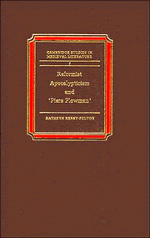Book contents
- Frontmatter
- Contents
- Acknowledgments
- List of abbreviations
- 1 Introduction
- 2 The visionary prophecy of Hildegard of Bingen in relation to Piers Plowman
- 3 Piers Plowman and the medieval visionary tradition
- 4 Leaven of malice: false apostles in the anti-mendicant apocalypticism of later medieval England
- 5 Leaven of hope: new leadership and Joachite apocalypticism
- 6 Conclusions
- Notes
- Select bibliography
- General index
- Index of biblical citations
- Index of manuscripts
5 - Leaven of hope: new leadership and Joachite apocalypticism
Published online by Cambridge University Press: 15 October 2009
- Frontmatter
- Contents
- Acknowledgments
- List of abbreviations
- 1 Introduction
- 2 The visionary prophecy of Hildegard of Bingen in relation to Piers Plowman
- 3 Piers Plowman and the medieval visionary tradition
- 4 Leaven of malice: false apostles in the anti-mendicant apocalypticism of later medieval England
- 5 Leaven of hope: new leadership and Joachite apocalypticism
- 6 Conclusions
- Notes
- Select bibliography
- General index
- Index of biblical citations
- Index of manuscripts
Summary
INTRODUCTION: JOACHITE APOCALYPTICISM IN MEDIEVAL ENGLAND
…the problem of poverty and the nature of evangelical perfection introduced a new element into the outlook of the later thirteenth and fourteenth centuries. Largely under the influence of Joachism and the call for a return to first apostolic principles, the present church came increasingly to be contrasted to the life of Christ and the apostles. There was a growing sense that the church had betrayed its primitive ideal … A return could be made only by the disendowment of the church, taking it to the poverty, humility, and simplicity preached and practiced by Christ and his disciples. The disputes of the schools went far beyond their walls.
(Leff, Paris, pp. 269–70)In this short paragraph Gordon LefF collects and focuses the issues and themes which will concern us in this section. By Langland's time so many apocalyptic strands were interwoven among these issues that it is impossible to study either separately. Piers Plowman reflects this faithfully. Among the issues that had coalesced around an apocalyptic sense of the need for reform were the problems of evangelical poverty and perfection, the sense that the Church had betrayed its primitive ideals and the related perception that this could be corrected only by clerical chastisement, disendowment and humiliation. The growing tendency among certain thinkers to compare the present Church, and especially the clergy, to the life of Christ and the apostles, and to question the discrepancies, came about, as LefF says, “largely under the influence of Joachism.” Just how largely is a question that has excited much scholarly debate in recent years, but even those scholars who have argued that the influence of Joachism has been overestimated would agree that its influence was considerable.
- Type
- Chapter
- Information
- Reformist Apocalypticism and Piers Plowman , pp. 162 - 200Publisher: Cambridge University PressPrint publication year: 1990



